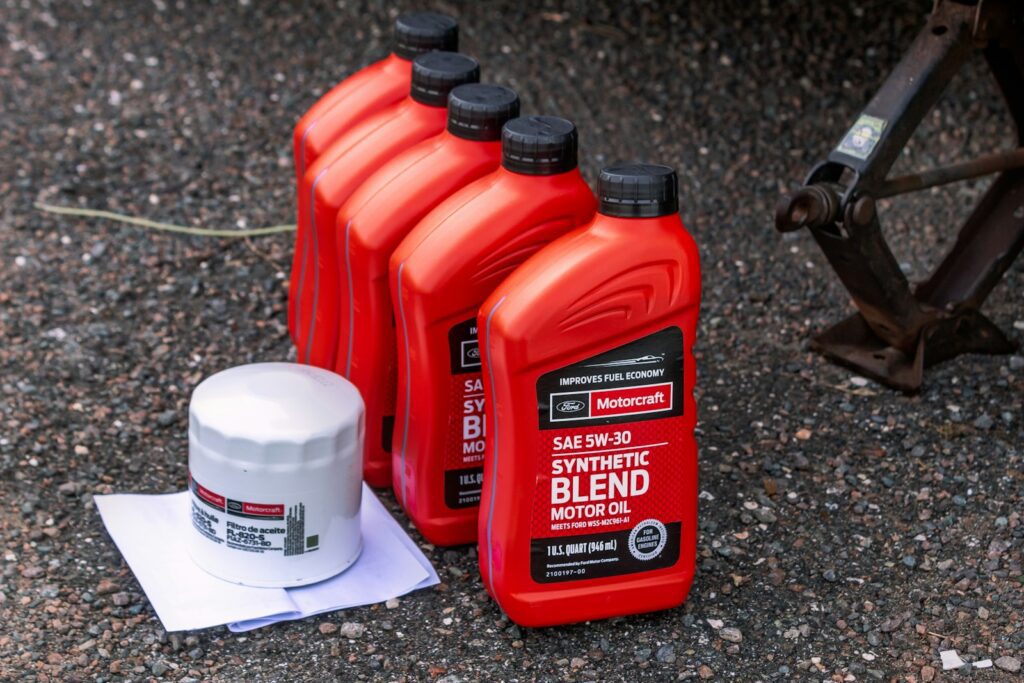How Scheduled Maintenance Improves Your Vehicle’s Fuel Efficiency
Fuel efficiency impacts your wallet and the environment. Efficient fuel use means fewer trips to the gas station and reduced carbon emissions, contributing to economic savings and environmental responsibility.
However, achieving optimal fuel efficiency isn’t solely about driving habits or fuel types; it also heavily relies on how well you maintain your vehicle. Scheduled maintenance with your trusted mechanic is the best way to guarantee your vehicle continues to get the most out of every tank of gas.

When your vehicle is properly serviced, all its components function harmoniously, allowing for smoother operation and reduced fuel consumption. Clean air filters, properly inflated tires, and well-lubricated engines all contribute to a more efficient fuel-to-air ratio and optimal engine performance.
What is scheduled maintenance?
Scheduled maintenance refers to the routine service and inspections performed on a vehicle at specific intervals, as recommended by the manufacturer. It’s a proactive approach to vehicle care, involving systemic checks and service tasks performed at regular intervals (usually according to the vehicle manufacturer’s recommendations).
You can find the schedule in your driver’s manual. Some are based on mileage, while others are based on time (or a combination).
These scheduled tasks are designed to keep the vehicle in optimal condition, ensuring its performance and safety over time. Understanding what scheduled maintenance entails and why it’s important can help vehicle owners maximize their car’s efficiency, reliability, and longevity.
Some of the most common types of routine maintenance include:
- Oil changes
- Tire rotations
- Air filter replacements
How does regular maintenance affect fuel efficiency?
Fuel efficiency is a key concern for vehicle owners, impacting both the cost of driving and environmental sustainability. One of the most effective ways to ensure that your vehicle operates at peak efficiency is through regular maintenance.
Regular maintenance tasks help keep your vehicle’s various systems functioning correctly, which in turn supports optimal fuel economy. When components are in good working order, the vehicle operates more smoothly, requiring less fuel to achieve the same performance levels.
Conversely, neglected maintenance can lead to inefficiencies and increased fuel consumption, as well as higher emissions.
Keeping the following components in optimal condition leads to better fuel economy:
- Engine efficiency. A well-maintained engine runs smoothly and efficiently. Regular oil changes, spark plug replacements, and air filter replacements help ensure that the engine operates at its best, which can significantly improve fuel efficiency. Clean oil reduces friction, spark plugs ensure proper combustion, and a clean air filter allows the engine to breathe properly, all contributing to better fuel economy.
- Tire condition. Keeping your tires properly inflated and regularly rotated impacts fuel efficiency. Under-inflated tires create more rolling resistance, causing the engine to work harder and consume more fuel. Regular tire maintenance, including checking and adjusting tire pressure and rotating tires to ensure even wear, can enhance fuel economy and improve vehicle handling.
- Fuel system. The fuel system, including fuel injectors and the fuel filter, is essential for maintaining efficient fuel consumption. Regular maintenance and cleaning of these components ensure that fuel is delivered properly and combusts efficiently in the engine. A clean fuel system helps optimize fuel use and can prevent problems such as poor acceleration and increased fuel consumption.
- Transmission health. Don’t forget about the transmission. A well-maintained transmission contributes to better fuel efficiency by ensuring smooth gear shifts and proper power transfer from the engine to the wheels. Regular transmission fluid checks and changes help maintain optimal transmission performance, preventing issues that could lead to increased fuel consumption.
Which maintenance tasks have the biggest impact on fuel efficiency?
Maintaining optimal fuel efficiency involves more than just monitoring your driving habits or choosing the right type of fuel. Regular maintenance of key vehicle components plays a crucial role in ensuring that your vehicle operates at peak efficiency.
Understanding which maintenance tasks have the most significant impact on fuel efficiency can help you prioritize your efforts and achieve better fuel economy.
Oil Changes
Regular oil changes are essential for maintaining engine efficiency. Over time, engine oil becomes contaminated with dirt, debris, and breakdown products, which can increase friction within the engine. Clean oil ensures that engine components are lubricated effectively, reducing friction and allowing the engine to operate smoothly.

Reducing friction helps the engine perform optimally, improving fuel efficiency and extending the engine’s lifespan. Including oil changes as part of your scheduled maintenance routine is a simple yet effective way to enhance your vehicle’s fuel economy.
Air Filter Replacement
The air filter plays a crucial role in ensuring that the engine receives a clean and adequate air-fuel mixture. A clogged or dirty air filter restricts airflow to the engine, leading to inefficient combustion and reduced engine performance.
When the air filter is clean, the engine can breathe properly, optimizing the air-fuel mixture and improving fuel efficiency. Regularly replacing the air filter helps maintain engine performance and ensures that fuel is burned more efficiently, contributing to better fuel economy.
Spark Plug Maintenance
Spark plugs are essential for the ignition process in the engine, as they create the spark needed to ignite the air-fuel mixture in the combustion chamber. Worn or dirty spark plugs can lead to incomplete combustion, resulting in reduced engine performance and increased fuel consumption.

Regular maintenance and replacement of spark plugs ensure that they function correctly, allowing for efficient fuel combustion and better fuel efficiency. Keeping spark plugs in good condition helps maintain smooth engine operation and optimal fuel economy.
Tire Maintenance
Proper tire maintenance significantly impacts fuel efficiency. Tires that are under-inflated create additional rolling resistance, causing the engine to work harder and consume more fuel. Ensuring that your tires are properly inflated according to the manufacturer’s specifications can improve fuel efficiency and reduce fuel consumption.
Additionally, regular tire rotations and alignments help ensure even tire wear and optimal handling, further contributing to better fuel economy. Maintaining your tires in good condition is a key factor in achieving and sustaining optimal fuel efficiency.
Fuel System Cleaning
A clean fuel system is vital for maintaining efficient fuel flow and combustion. Over time, fuel injectors and the fuel filter can become clogged with impurities, leading to reduced fuel flow and inefficient combustion.
Regularly cleaning the fuel system helps deliver fuel smoothly and efficiently to the engine. This improves combustion efficiency and enhances overall engine performance and fuel economy. Regular fuel system cleaning helps maintain a clean and efficient fuel delivery system, contributing to better fuel efficiency.
What are signs your vehicle needs better fuel efficiency?
Maintaining optimal fuel efficiency requires adhering to a regular maintenance schedule and staying vigilant for signs that indicate your vehicle might need attention.
Recognizing and addressing these signs promptly can help prevent further fuel efficiency loss and avoid more significant mechanical problems.
Some of the most common signs your vehicle isn’t getting the most out of each tank of gas include:
- Decrease fuel economy. One of the most obvious signs that your vehicle needs maintenance is a noticeable drop in fuel economy. If you find that you’re making more frequent trips to the gas station or your vehicle’s fuel consumption seems unusually high, it’s a clear indication that something might be wrong. Decreased fuel economy can be caused by various issues, including clogged air filters, dirty fuel injectors, or worn spark plugs.
- Engine performance issues. Engine performance problems, such as rough idling, poor acceleration, or hesitation during acceleration, can directly impact fuel efficiency. These issues often signal underlying maintenance needs, such as a malfunctioning air filter, faulty spark plugs, or problems with the fuel system. A well-maintained engine runs smoothly and efficiently, contributing to better fuel economy.
- Unusual noises or vibrations. Unusual noises or vibrations coming from your vehicle can indicate various mechanical issues that might affect fuel efficiency. A failing exhaust system or misaligned tires can lead to increased fuel consumption. Unusual noises, such as knocking or grinding, and vibrations during driving should be investigated ASAP.
- Dashboard warning lights. The last line of defense, dashboard warning lights signal a range of problems that can affect fuel efficiency. The check engine light can indicate a range of problems, including issues with the fuel system, spark plugs, or air filters. Other warning lights, such as those related to the engine or transmission, may also signal maintenance needs.
DIY vs. scheduled maintenance for fuel efficiency issues
Maintaining your vehicle’s fuel efficiency involves various tasks that can range from simple to complex. For many vehicle owners, performing DIY maintenance offers a cost-effective way to keep their cars running smoothly. While some maintenance tasks can be handled at home, others are better suited for professional mechanics as part of scheduled maintenance.
Changing your oil is one of the most common DIY tasks. With the right equipment, oil, and oil filter, you can easily perform this task yourself. Make sure you dispose of the used oil the right way if you decide to do the task yourself.
Some other things you can do yourself include:
- Air filter replacement
- Adjusting tire pressure
- Replacing wiper blades
Scheduled maintenance guarantees fuel efficiency
Maintaining optimal fuel efficiency is crucial for both economic and environmental reasons. Regular maintenance plays a pivotal role in ensuring that your vehicle performs at its best and consumes fuel efficiently.
Knowing the signs – decreased fuel economy, engine performance issues, and warning lights – can help you address potential problems before they worsen. For many routine tasks, DIY maintenance can offer cost-effective solutions, but it’s important to understand its limitations and recognize when professional assistance is needed.